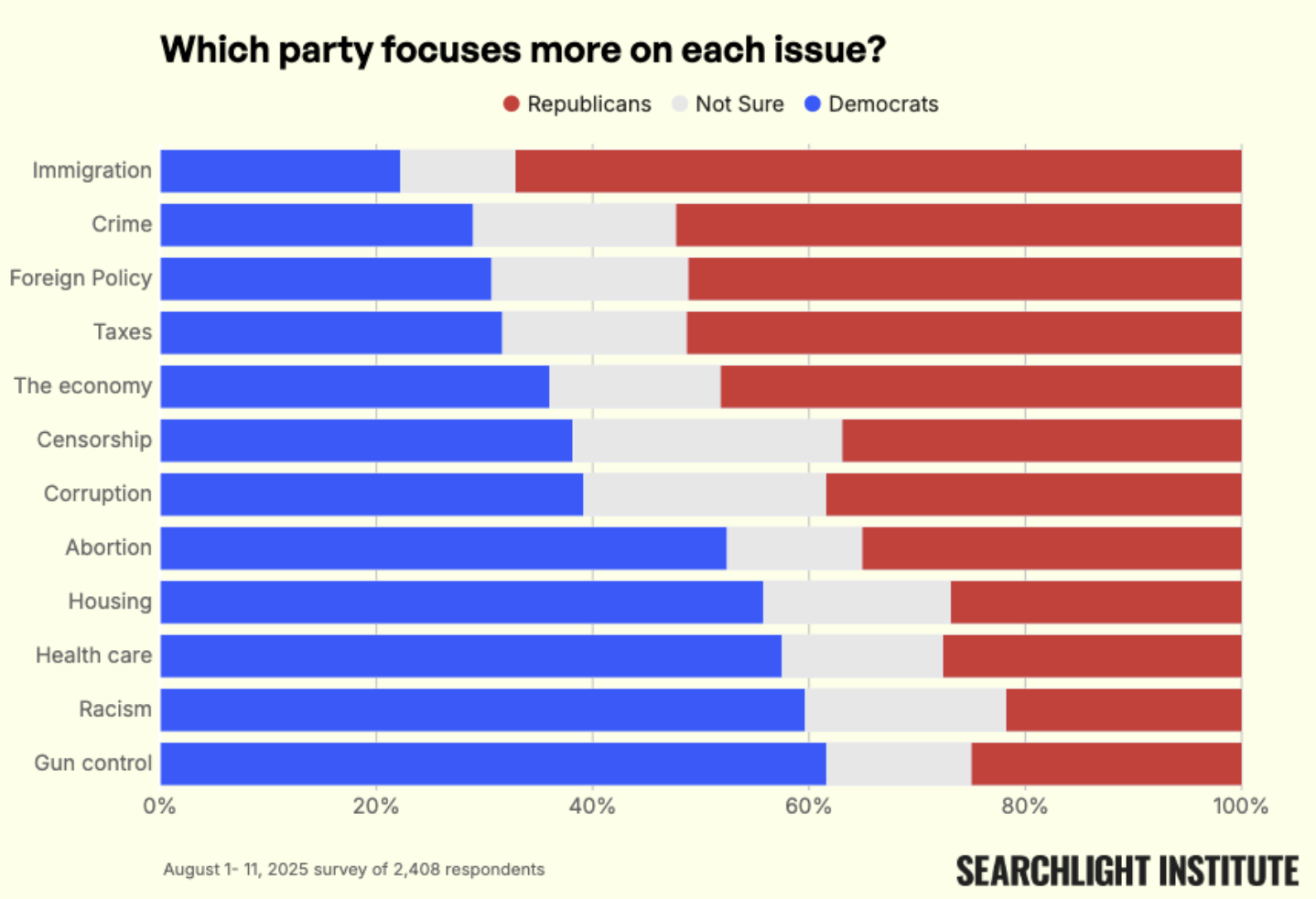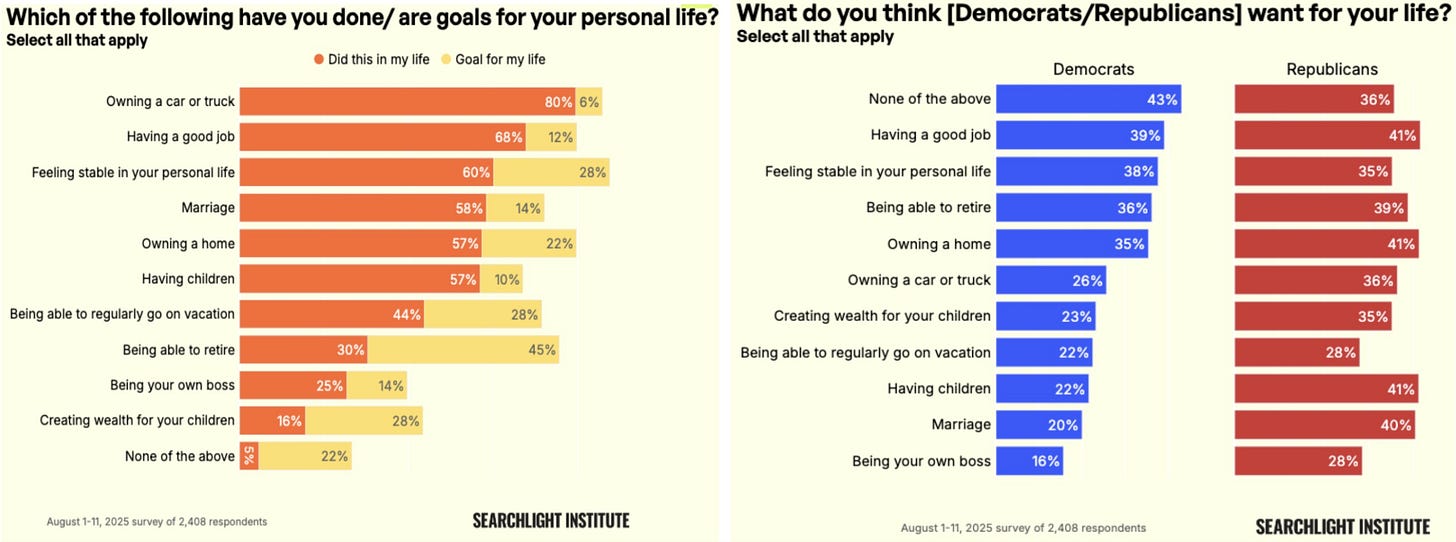The Democrats' Dim Searchlight
The Searchlight Institute aims to disrupt the Democratic Party from within. Can it kill the party’s new sacred cows?
The Democratic Party finds itself facing a stark reality. The coalition of organized labor, racial minorities, college-educated social justice activists, and economic liberalism that once powered it is unraveling. Voters may still care about progressive ideals from the Clinton and Obama eras, yet they feel distant from a party that asks them to abandon the science of biology, embrace racial “equity,” and completely desert any frayed notion that capitalism lifts people out of poverty. The party’s message, now firmly rooted in postmodernism, appears less and less like a message about how your life can be better and more about how you should live better.
Enter the Searchlight Institute. Founded by former Senate staffer and Democratic strategist Adam Jentleson, the institute presents itself as a corrective for the party’s drift. Searchlight argues that if Republicans gained traction by aligning with “good-life goals” and everyday economic concerns such as jobs, stability, ownership, and independence, then Democrats must pivot accordingly. The message is clear: you can’t just talk about justice. You also must include prosperity, household security, and the American dream. In this moment, Searchlight is both a symptom and an actor, and possibly a sign that the Democratic Party is shifting from a culture-first approach to one that embraces economics and living standards.
That dichotomy speaks to what could be the biggest challenge of all: leadership. For all the talk about fresh ideas and connecting with real Americans, the Democrats’ would-be change agents look awfully familiar. Take Jentleson, the Searchlight Institute’s founder. He’s a former deputy chief of staff to Senator Harry Reid, a longtime Capitol Hill staffer, and a man whose résumé reads like a guided tour of the Washington establishment. If the Democratic Party were serious about an internal revolution, it’s curious that the person leading the charge to reinvent its populist message is, quite literally, a creature of the swamp.
Jentleson’s defenders would counter that experience matters, that he knows how the system works and can make it deliver for working-class voters again. Fair enough. But that argument sounds suspiciously like the one that has insulated professional Democrats for decades: trust us, we’ve got the levers of power under control.
The problem is that voters no longer buy it. In an era when even mainstream liberals admit the party has lost its connection to the middle class, choosing a Beltway strategist as the face of reform feels tone-deaf.
Publicly, Jentleson preaches a new Democratic populism. With Searchlight, he declares that the party must emphasize “good-life” goals rather than abstract moral crusades. Politico describes Jentleson’s operation as “an explicit rejection of purity tests” which he “sees as holding the party hostage.” Less fixation on pronouns and racial dynamics, more focus on public safety and the cost of living. It’s a compelling message on paper, but one that risks collapsing under the weight of its own contradictions.
Can a man who spent his career in the Senate’s marble corridors really claim to speak for the disillusioned contractor in Ohio or the single mother in rural Georgia? When populism becomes a product of focus groups, it stops feeling like populism.
What’s more, Jentleson’s public image underscores the gap between insider credibility and grassroots legitimacy. There’s no indication that ordinary voters know his name, let alone trust him. What visibility he has comes from Washington-centric coverage: profiles in Jacobin hailing him as a reformer, CBS News interviews on the filibuster, or insider gossip about his stint as chief of staff to Senator John Fetterman.
That last role thrust him briefly into controversy when a leaked email raised questions about Fetterman’s health and staff management, exactly the sort of inside-baseball drama that makes regular Americans roll their eyes and mutter, “This is the swamp.”
And Jentleson isn’t alone. Searchlight’s director of operations is “a longtime hill staffer and unapologetic Senate snob,” while its analytics director worked on Senator Elizabeth Warren’s presidential campaign along with “a variety of organizations in Democratic politics and advocacy.”
Genuine renewal rarely begins with the same consultants who helped build the system in the first place. If Democrats think they can out-populist Republicans by forging a new generation of policy from the same circle of Senate veterans, they misunderstand what drives the populist wave entirely.
Voters don’t want new slogans about the “good life.” They want proof that someone in power actually remembers what that life looks like outside of Washington.
Searching for Change
Jentleson himself wrote in the New York Times that “unlike Democrats, Mr. Trump engaged in what I call supermajority thinking: envisioning what it would take to achieve an electoral realignment and working from there.” He says that “unless Democrats want to be consigned to minority status and be locked out of the Senate for the foreseeable future, they need to counter by building a supermajority of their own.” Jentleson believes that the intense polarization in American politics will not last forever, and if either party is able to adapt correctly, it will attract broader support. Searchlight was seemingly founded in direct response to the 2024 Election.
Its mission statement holds that: “Throughout history, new ideas have spelled the end of one era and the beginning of another,” and that the potential for “rearranging political coalitions and sparking realignments” is strong. Most striking, though, is the statement that “we at the Searchlight Institute believe that a realignment is not just possible, but necessary.” It’s almost as if they’re saying that if progressives and the Democratic Party do not evolve, they will simply die out as a species capable of governing.
Some of Searchlight’s research indicates its policy direction. One poll from October asked respondents about topics ranging from immigration to gun control to taxes.
The results showed that American voters have a clear-cut perception of what matters most to each party, with Republicans indicating they were most interested in immigration, crime, and taxes, while health care, racism, and gun control were the top issues for Democrats. What was most eye-opening, however, was the next section.
Participants ranked markers of “the good life,” as Searchlight calls it, and which party wanted to see them achieve it. The results once again showcase a disconnect between the American people and the Democrats.
In all areas but one, respondents said that Democrats do not care about them having things like homeownership and a wealthy future for their family as much as Republicans do. Searchlight concludes its report with a surprisingly accurate assessment: “Everything is expensive right now, and Americans are feeling way less confident that they can afford the same things that previous generations could,” adding that, “inflation and the affordability crisis are certainly a big part of why Americans aren’t feeling overwhelmingly positive about what either party wants for them.”
Searchlight’s own data shows that this viewpoint is reasonable. But the report’s final statement raises questions: “Democrats are also clearly failing to articulate a vision that champions the personal achievements and prosperity that most Americans seek throughout their lives.” The party must adjust if it wants to win. But how likely is a major shift in the policy priorities of the Democrats, one radical enough to change public perception like the MAGA movement did for Republicans?
Searchlight argues that if Democrats want to become the party of the good life, they’ll have to show more than smart op-eds or moral indignation. They’ll have to actually advocate policy that improves people’s lives. On that score, the record from the last several years is mixed. Democratic leaders in the White House and on Capitol Hill did push through a handful of large bills funding infrastructure, insulin price controls, and placed-base economics around manufacturing that touched people’s lives. However, the bulk of Democratic proposals were often temporary, contested, or scaled back.
Some of the Democratic Party’s most explicit attempts at working-class economics were either diluted or blocked. The Build Back Better framework, for example, included a universal paid family and medical leave proposal and other measures that would have spoken to marriage, family formation, and stability. But negotiators and holdout senators stripped or stalled many of those ideas, allowing conservatives to argue, correctly, that Democrats talk big about “families” but can’t close the deal.
Now, at a moment when voters increasingly ask: “What are you doing for me?” The Democrats seem to answer with what they are doing for others. Poll after poll confirms this disconnect. For example, a recent Pew Research Center survey found that “three-quarters of U.S. adults say the Democratic Party makes them feel frustrated” and only 28% say the state of the party makes them feel hopeful, a striking indicator of where things stand. The Democratic brand is vulnerable. Voters are more unsure than ever about whether the party understands their priorities and wants what they want: a secure job, stable family life, and rising living standards.
Some Democratic moves on this front could be seen as wins. The American Rescue Plan Act of 2021 delivered an expanded Child Tax Credit, giving families up to $3,600 per child to help cover basic household expenses like rent and groceries. But the caveats matter here too. The enhanced CTC, arguably one of the most direct lifts to family incomes, was temporary. When it ended, child-poverty rates climbed again, and the political praise turned to frustration. Voters noticed the relief, and they noticed its expiration. Short-lived policy triumphs are electoral traps: they raise expectations but leave voters asking why the help didn’t stick.
If the Democratic Party’s strategic aim is to convince voters it stands for durable personal security and prosperity, rhetoric alone won’t do.
Making matters worse, locked out of power and searching for meaning, Democrats have sat and watched as President Trump renegotiated drug prices, created a government website where Americans can shop around for prescription drugs, and took government stakes in private companies. All of these ideas were proposed by the Left but unaccomplished during the Biden administration.
A Democratic House Divided
What remains to be seen is whether a sweeping policy change emerges from Democrats at the national level, and if it does, whether it will win them newfound support. While the party seems to be aware that appealing to the economic concerns of working- and middle-class voters is a way to regain lost ground, it fails to understand that the Democratic base of Washington elitists and Brooklyn NIMBYs have open contempt for the voters that Searchlight wants to win back.
For decades, Democrats have asked, “what’s the problem with Kansas?” In other words, why are working-class voters, including voters of color, increasingly rejecting what we know is best for them?
Democratic venom for the American people has been on full display for decades, including President Obama’s criticism of people in the Rust Belt who cling to their guns and Bibles, and Hillary Clinton’s labeling half of Trump supporters as a “basket of deplorables.” Better childcare policy alone isn’t going to fix that.
And while Searchlight says it’s working to fix the border and reform asylum, President Trump’s first year in office is proof enough that you don’t need more white papers, you just need to care about a subject enough to enforce the laws. Americans need someone who doesn’t begin a conversation about immigration from the viewpoint of protecting lawbreakers. Democrats also refuse to acknowledge the fact that you cannot have a twenty-first century economy and a government that looks out for the working class while importing poverty from the Third World, yet that’s exactly what Searchlight’s prescription for the immigration system is: expanded legal immigration. It’s like they saw the economic chaos around the issues of housing, welfare, and collapsing social capital that has embroiled the Anglosphere and thought, “let’s try that in America.”
The progressive DNA stipulates that Americans are too stupid for the jobs of the future so we need tech workers from India, too lazy for agricultural labor so we need daylaborers from Mexico, too proud to work in the hospitality industry so we need gardeners, maids, and bus boys from Central America, and too expensive to mass produce most products so we need to ship manufacturing jobs overseas. Their answer to solving poverty is simply to regulate who can succeed, leaving the unwashed masses without a college degree to enjoy a series of government handouts while working as Walmart greeters.
Even if economic populism is emphasized at a surface level, the hipster with pronouns in their bio who wants to talk about bike lanes, stolen land, climate justice, and access to medical care for gender non-confirming teenagers cannot relate to the American worker who wants pride in themselves, their occupation, and their place in society. The balancing act is precarious: offering policies that resonate with average Americans while keeping a coherent identity that differentiates the party from the GOP. Until voters see both a credible economic vision and a political brand that distances itself from policies that ask voters to feel shame, Democrats will struggle to translate strategic pivots into electoral gains. In short, the party can change the messaging, but whether it can change the hearts of its base remains to be seen.







I didn’t vote for Harris or Trump and have no regrets about that decision. Even as the Republican train goes off the rails driven by an increasingly insane engineer my former party the Democratic Party sinks even deeper. The Democrats lost in 2024 and will continue to lose in the future (notwithstanding their recent wins in blue states) because of one reason. They have lost the support of the American working class. The historic Democratic icons FDR, and JFK would laugh at what passes for policy in their beloved party. Although they were upper class they understood that victory for their party depended on appealing to working class voters. Current party leaders distain the “deplorable” and “racist” members of the working class. Working class Americans hate the following four policies foisted on them by Democrats.
Working class people have had their wages depressed by illegal immigrants who will work for next to nothing just to be here. Their rents rise because we don’t have enough housing for our own citizens let alone millions of interlopers. The Democrats opened our borders to all with no vetting and now complain when the worst among those who entered illegally are sent home. The age of mass migration is over. People have to stay home and fix their own country. A major reason Trump won was that he understood this reality.
Democrats believe that a man can become a woman (he can’t) and should be allowed to play women’s sports and enter women’s private spaces including, unbelievably, those where they are naked and vulnerable, and that children, many of whom would grow up to be gay, should be mutilated in pursuit of the impossible. The vast majority of Americans and especially working class men want to protect women and children.
Democrats continue to discriminate on the basis of race and sex today because in the past there was discrimination on the basis of race and sex. That’s unconstitutional and a violation of the Civil Rights Act the Democrats passed in 1964 and the working class knows it.
Democrats allow the homeless, largely drug addicted and/or mentally ill individuals to degrade the quality of life of productive citizens because no one will say no: "no, you can't camp anywhere you want", "no, you can't shoot up and leave your used needles lying around", "no, you can't shit in our streets", no, you can't panhandle aggressively". We did a huge disservice to the homeless themselves when we closed rather than reform our state mental health hospitals. We need them back to provide custodial care for those who can’t survive in today’s world unassisted.
They also need to admit that crime in big cities continues to be a major problem and to quit allowing Trump to take control of this issue. Make fighting criminals a major priority of the Democratic Party and especially Democratic mayors. Why are they always on their back foot on this issue? There is no political logic to being seen as soft on crime when most of the victims of crime are the very minorities that Democrats are supposed to champion. The single most important thing Democrats could do to save the lives of young black men would be to reinstitute the police policy of “stop and frisk” in black neighborhoods to stop the carrying of illegal guns. This would stem the tide of murders of blacks that fill the nightly news in every major city in America. These kids would quickly get the message and quit carrying illegally. Young black men (15-34) are just 2% of the population and yet commit about half of the nation’s homicides. A rate an astounding 50 times higher than the average American. They are also the primary victims of these murders. We need to save their lives in spite of all the ACLU bullshit niceties.
It’s simply incredible to me that the Trump administration led by someone who I have no respect for is actually taking meaningful steps to address these problems while the Democrats either do nothing or actively resist needed change. Working class people (white and black) understand that this is happening and will never again give full support to the Democratic Party.
The Democrats are burdened by many of their own powerful benefactors. Here's just two:
Building housing will require that the environmentalists like the Sierra Club be neutered, but that's not going to happen. Also, is the Trial Lawyers Association going to support revised environmental laws that reduce lawsuits? Not likely.